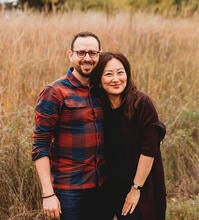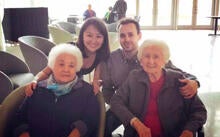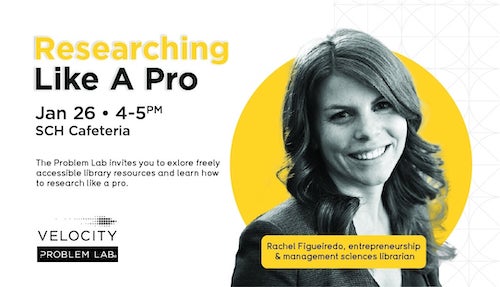Editor:
Brandon Sweet
University Communications
bulletin@uwaterloo.ca
University provides more information about Policy 76/77 discussions
A message from James W.E. Rush, Vice-President, Academic & Provost; David DeVidi, Associate Vice-President, Academic; Anna Esselment, Associate Dean, Graduate Studies, Faculty of Arts and President's appointee to the Policy Drafting Committee, and Ian VanderBurgh, Continuing Lecturer, Faculty of Mathematics, and President's appointee to the Policy Drafting Committee.
We recently wrote to share some principles behind the University’s approach to revisions to Policy 76 and Policy 77. We want to reinforce how important we believe it is to have a strong and well-defined teaching stream at Waterloo.
Lecturers have been an important part of teaching delivery at Waterloo for decades and they make important contributions in other ways such as in student support and curriculum design. Better clarity in our policies and in our Memorandum of Agreement about teaching-focused positions is overdue, and will benefit the University as well as current and future teaching stream faculty.
We want to be clear about some of the University’s thinking on the changes that we need to implement.
- Tenure stream and teaching stream positions should have similarities and differences.
All faculty members at our University are educators who contribute to student learning, student experience, and student success.
Tenure stream faculty members have scholarship/research as a significant part of their responsibilities, and an expectation that they consistently produce peer reviewed or professionally assessed scholarly work or research. They must balance scholarship/research, service and teaching every term, regardless of whether they are formally teaching courses.
We believe teaching stream faculty members should be primarily focussed on teaching. We also believe that teaching stream faculty should have service responsibilities that enrich the life of the University. Teaching stream faculty members need to be experts in the fields in which they teach and should be able to devote time to pedagogical and professional development. At the same time, we believe that teaching stream faculty members can and will be effective teachers without the expectation to consistently produce peer reviewed scholarship and research.
As we consider these changes to policy and our Memorandum of Agreement, the University will seek to avoid imbalances between tenure stream faculty (who contribute to the University’s mission through teaching, scholarship/research, and service), and teaching stream faculty (who contribute primarily through teaching and service). We want to create teaching stream positions that attract excellent candidates who will find careers as University educators rewarding.
- Teaching is a complex task that happens in many different ways and places.
Over the past eight years, many of our colleagues have contributed to important working groups that have invested significant time and energy to better understand the art of teaching and the assessment of teaching. In June 2022, after many rounds of cross-campus consultation, a framework that characterizes effective teaching was published and received by the Senate. We will begin further work shortly that will recommend triangulation approaches for the variety of teaching assessment tools that are being used.
We envision teaching stream faculty taking leadership roles in teaching and learning and in their assessment. There are many forms beyond class delivery that contributions to teaching and learning can take, including, but not limited to, developing novel pedagogical approaches, creating learning assets, writing textbooks, participating in the scholarship of teaching and learning, mentoring students, and contributing to course and curriculum design and development. We are working towards developing policies that reflect and embrace an expansive view of scholarly teaching activities. It is important to recognize that teaching stream faculty members are already deeply involved in such work.
Of course, just as research takes a variety of forms and no individual faculty member contributes to all of them, there will be many ways in which teaching stream faculty members will contribute to teaching and learning at Waterloo, and no individual will be involved in all such aspects.
- Teaching stream faculty members need a well-defined path to permanence and the protections afforded by well-understood, ongoing jobs at a University.
While roughly half of our current Lecturers are in continuing positions, their paths to these positions have not been clearly articulated in policy. We need policies that set out timelines and procedures to permanence, as they already do for tenure stream faculty.
Revised policies must also provide assurances of academic freedom to all teaching stream faculty and of job security to permanent teaching stream faculty in similar ways as current policies do for those in the tenure stream. These protections will benefit teaching stream faculty, both in their teaching and in their service, and will thus benefit our students.
We are committed to working collegially to carefully create and calibrate processes for permanence and promotion for our teaching stream faculty.
As we acknowledged in our previous communication, balancing all of these principles and goals is not easy. Continuing teaching stream faculty members now make up roughly 10 per cent of our faculty, and teaching stream faculty make up roughly 20 per cent overall. For too long, they have not been recognized uniformly for the work that they do.
Many of you have questions and concerns about what you've heard and read about the University's approach and perspective. We are committed to negotiating these issues in good faith according to the process agreed to at the Faculty Relations Committee in September and endorsed by Senate in October. This process has reached the mediation stage, and we must allow the mediator to do her job.
Tenure stream and teaching stream faculty positions need to be different, but complementary, because of the varying functions that they serve on our campuses. But the importance of current and future teaching stream faculty members in our operations and our governance processes should be appreciated and celebrated to best position the University for even greater success ahead.
Building a bridge between two cultures through a beloved game

By Angelica Marie Sanchez. This article originally appeared in the Fall 2022 issue of Waterloo Magazine.

When Jennifer Guo (BA ’10) and her husband Adam Szakacs were expecting their first daughter, they thought of ways their child could connect with her Chinese and Jewish heritage in a personal way.
“At the time, our family was living in Canada, and we were living in New York, so we were thinking about how difficult it would be for her to see her family regularly,” Guo said. “We wanted a way to keep the memory alive of family members and the experiences that we had growing up.”
Guo recalled how, despite a language barrier, her grandmother was able to connect with Szakacs’s grandmother through their shared love of mahjong, a traditional game she had played as a child with her grandmother.
Reimagining a multi-generational game
So, Guo and Szakacs created Not Your Ma’s Jong – a devolved card version of mahjong – to connect their children with their heritage and celebrate their grandmothers’ shared love of the game.
Mahjong is a traditional, 144-tile game with different versions played globally that can take days. People can be substituted into the game so the first players can rest before coming back to play.
Not Your Ma’s Jong is a fast-paced party game in which players race to collect card sets and take their opponents’ tokens. From the colour of the cards to the food and activities illustrated, Guo incorporated Chinese and Jewish emblems in a respectful way that either resonate with card players or introduce them to two different cultures.
Today, Not Your Ma’s Jong is an international card game translated into different languages that is played around the world. Guo decided to have Hasbro license the game because the company kept it almost exactly like their original concept. “Their ambition was to really spread this message of being proud of who you are and your heritage and to celebrate different cultures.”

Building relationships within a community
While the game itself is inspired by two grandmothers, Guo is constantly inspired by her mother’s outlook on building relationships. As an immigrant, Guo’s mother always encouraged her to be open and make connections with people by sharing her Chinese background.
Guo hopes to ingrain this lesson with her two daughters through Not Your Ma’s Jong and hopefully encourage them to share parts of their Chinese and Jewish culture with their friends as they grow up.

Guo hopes the game can help connect people around the world and educate those who may not know any Jewish or Chinese people to give players, “a little glimpse of someone else’s life, upbringing and cultural experience — that is really humbling to know that could be a possibility.”
Guo also dreams of finally visiting her family again in China so she can play Not Your Ma’s Jong with the people who inspired the game.
Dean of Science writes three-part series in support of basic research

This article was originally published on the Faculty of Science website.
Dr. Bob Lemieux, our Dean of Science, has written a three-part series to demonstrate why conducting basic research is critical to our ongoing quest to innovate. The first article was published on LinkedIn.
Basic research aims to expand various fields of knowledge and improve our understanding of natural and physical phenomena rather than solving a specific problem. It's slow and incremental nature combined with no immediate commercial value means basic research is often overlooked in favour of applied research.
"Basic research has fuelled innovation and changed the world in many ways," says Dr. Lemieux. "It shows that you cannot program innovation—you cannot predict the ‘next big thing.’ Supporting basic research is often a leap of faith, although history has demonstrated that it continues to be a pretty solid bet."
The first part of the series provides an overview of basic research. Lemieux outlines the challenges and hurdles facing basic research, including a progressive erosion of funding. He demonstrates the important role that basic research provides to the innovation pipeline as well as training the next generation of scientists.
The second piece in the series will focus on the discovery of liquid crystals - a serendipitous discovery from 1888 that changed the world as we know it.
Researching like a pro and other notes

This Thursday, Velocity presents Researching Like A Pro. "In this workshop, Rachel Figueiredo, Entrepreneurship & Management Sciences Librarian, will teach you how to research your ideas to determine if they would make a good business," says a message from Velocity. "Students attending this session will learn the basics of market and industry research – what it is and how to do it – by getting hands-on experience using the Library’s market research resources."
The event takes place from 4:00 p.m. to 5:00 p.m. in SCH 228. Pizza and water will be provided. Register now.

Also this Thursday, as part of the 40th Anniversary Lectures in Catholic Experience series, St. Jerome's University presents Fr. Toby Collins, CR who will deliver a lecture entitled Tiny Resurrections for Today.
"However tiny it may seem, Fr. Toby believes the presence of God is in each and every one of us," says the note from SJU. "To discover it one must be willing to encounter the poor, less fortunate, oppressed, marginalized, and suffering...The Tiny Home Takeout and the tiny homes at A Better Tent City will be looked at specifically as modern vehicles for rediscovering the tiny presence of love in the other. Fr. Toby will unpack the effects of these programs on those experiencing poverty and isolation without neglecting to spend time on the accidental transformation experienced by volunteers and employees alike." Joining Fr. Toby will be Marion Thomson Howell, who will present information on A Better Tent City. Fr. Toby is currently the pastor of St. Mary's Church in downtown Kitchener and a Board member for A Better Tent City.
Plant Operations has announced that there will be a temporary closure of exterior stairs from M Lot to the PAC on Wednesday, January 25 as a permanent railing will be installed. The exterior stairway at Lyle Hallman will be temporarily closed from 7:30 a.m. to 4:00 p.m. on Wednesday. Work will be postponed to the following day should the weather be poor.
Here's today's Consent Week Tip of the Day provided by the Sexual Violence Prevention and Response Office (SVPRO):
It is important to teach children their body belongs to them. Children, like adults, have the right to decide who touches them and how. The learning of this valuable message can begin when children are toddlers. By hugging, kissing and tickling children without their permission we are teaching them that people can touch them without their consent.
Tip: Ask children before you hug, kiss or tickle them. Pay close attention to their body language and facial expressions for signs they are not comfortable. Model consensual behaviour for them. Teach them they can say no and that their body belongs to them.
Join us today from 12 noon to 1:00 p.m. on Microsoft Teams for a Staff and Faculty Lunch and Learn where we will discuss how and why to talk to young children about consent and boundaries. Register here to receive your link.
Link of the day
I love it when a plan comes together: The A-Team at 40
When and Where to get support
Students can visit the Student Success Office online for supports including academic development, international student resources, immigration consulting, leadership development, exchange and study abroad, and opportunities to get involved.
Instructors looking for targeted support for developing online components for blended learning courses, transitioning remote to fully online courses, revising current online courses, and more please visit Agile Development | Centre for Extended Learning | University of Waterloo (uwaterloo.ca).
Faculty, staff, post-doc and graduate student instructors can find upcoming teaching and learning workshops, self-directed modules and recordings of previous events on Centre for Teaching Excellence Workshops and Events page.
Instructors can access the EdTech Hub to find support on Waterloo’s centrally supported EdTech tools. The Hub is supported by members of IST’s Instructional Technologies and Media Services, Centre for Teaching Excellence, Centre for Extended Learning and subject matter experts from other campus areas.
Supports are available for employees returning to campus. Visit IST’s Hybrid Work and Technology guidelines and workplace protocols to assist with the transition.
Students with permanent, temporary and suspected disabilities and disabling conditions (medical conditions, injuries, or trauma from discrimination, violence, or oppression) can register with AccessAbility Services for academic accommodations (classroom accommodations, testing accommodations, milestone accommodations).
Instructors can visit AccessAbility Services' Faculty and Staff web page for information about the Instructor/Faculty role in the accommodation process. Instructors/Faculty members are legally required to accommodate students with disabilities. AccessAbility Services (AAS) is here to help you understand your obligations, and to offer services and resources to help you facilitate accommodations.
The Writing and Communication Centre has in-person and virtual services to support grad and undergrad students, postdocs and faculty with any writing or communication project. Services include one-to-one appointments, drop-ins at Dana Porter Library, online workshops, writing groups, English conversation practice, and custom in-class workshops.
Research Ethics: Find yourself with an ethical question, unsure if your work requires an ethics review, or need advice about putting together a research ethics application? Reach out to one of our friendly staff by booking a consultation or email us with your questions.
Co-op students can get help finding a job and find supports to successfully work remotely, develop new skills, access wellness and career information, and contact a co-op or career advisor.
The Centre for Career Action (CCA) has services and programs to support undergrads, grad students, postdocs, alumni, and employees in figuring out what they value, what they’re good at, and how to access meaningful work, co-op, volunteer, or graduate/professional school opportunities. Questions about CCA's services? Live chat, call 519-888-4047, or stop by our front desk in the Tatham Centre 8:30 a.m. to 4:30 p.m., Monday to Friday.
Drop-in to in-person Warrior Study Halls on Thursdays from 5:00 p.m. to 6:30 p.m. in DC and DP. Join a Peer Success Coach to set goals and work independently or in groups each week.
Renison's English Language Institute continues to offer virtual events and workshops to help students practice their English language skills.
If you feel overwhelmed or anxious and need to talk to somebody, please contact the University’s Campus Wellness services, either Health Services or Counselling Services. You can also contact the University's Centre for Mental Health Research and Treatment. Good2Talk is a post-secondary student helpline available to all students.
The Library is here to help, both in person and online. Our spaces are open for access to book stacks, study space, computers and printers, and the IST Help Desk. For in-depth support, meet one-to-one with Librarians, Special Collections & Archives and Geospatial Centre staff. Access our resources online for anywhere, anytime learning and research. Full details on current services and hours are available on the Library’s COVID-19 Update webpage.
The Faculty Association of the University of Waterloo (FAUW) continues to advocate for its members. Check out the FAUW blog for more information.
The University of Waterloo Staff Association (UWSA) continues to advocate for its members. Check out the UWSA blog for more information.
The Office of Equity, Diversity, Inclusion & Anti-Racism (EDI-R) works with students, faculty and staff across campus to advance equity and Anti-racism through evidence-based policies, practices and programs. If you have a concern related to Anti-racism and/or equity, please complete our intake form.
The Sexual Violence Prevention and Response Office (SVPRO) supports all members of the University of Waterloo campus community who have experienced, or been impacted, by sexual violence. This includes all students, staff, faculty and visitors on the main campus, the satellite campuses, and at the affiliated and federated Waterloo Institutes and Colleges. For support, email: svpro@uwaterloo.ca or visit the SVPRO website.
The Office of Indigenous Relations is a central hub that provides guidance, support, and resources to all Indigenous and non-Indigenous campus community members and oversees the University's Indigenization strategy.
The Waterloo Indigenous Student Centre, based at United College, provides support and resources for Indigenous students, and educational outreach programs for the broader community, including lectures, and events.
WUSA supports for students:
Peer support - MATES, Glow Centre, RAISE, Women’s Centre - Click on one of the links to book an appointment either in person or online for the term.
Food Support Service food hampers are currently available from the Turnkey Desk 24/7 in the Student Life Centre. Drop-off locations are also open again in SLC, DC, DP, SCH, and all residences.
Co-op Connection all available online.
Centre for Academic Policy Support - CAPS is here to assist Waterloo undergraduates throughout their experience in navigating academic policy in the instances of filing petitions, grievances and appeals. Please contact them at caps@wusa.ca.
WUSA Student Legal Protection Program - Seeking legal counsel can be intimidating, especially if it’s your first time facing a legal issue. The legal assistance helpline provides quick access to legal advice in any area of law, including criminal. Just call 1-833-202-4571.
Empower Me is a confidential mental health and wellness service that connects students with qualified counsellors 24/7. They can be reached at 1-833-628-5589.
GSA-UW supports for graduate students:
The Graduate Student Association (GSA-UW) supports students’ academic and social experience and promotes their well-being.
Advising and Support - The GSA advises graduate students experiencing challenges and can help with navigating university policies & filing a grievance, appeal, or petition.
Mental Health covered by the Health Plan - The GSA Health Plan now has an 80 per cent coverage rate (up to $800/year) for Mental Health Practitioners. Your plan includes coverage for psychologists, registered social workers, psychotherapists, and clinical counselors.
Dental Care - The GSA Dental Plan covers 60 to 70 per cent of your dental costs and by visiting dental professionals who are members of the Studentcare Networks, you can receive an additional 20 to 30 per cent coverage.
Student Legal Protection Program - Your GSA fees give you access to unlimited legal advice, accessible via a toll-free helpline: +1-833-202-4571. This advice covers topics including housing disputes, employment disputes, and disputes with an academic institution.
The Graduate House: Open Monday to Tuesday 11:30 a.m. to 7:00 p.m. and Wednesday to Friday 11:30 a.m. to 9:00 p.m. We’re open to all students, faculty, staff, and community members. The Graduate House is a community space run by the GSA-UW. We’re adding new items to the menu. Graduate students who paid their fees can get discounts and free coffee.
When and Where
Warriors Game Day Tickets and Season Passes, on sale now. Cheer on your Warriors W/M Basketball, Football W/M Hockey and W/M Volleyball teams at home during the 2022-23 season. Purchase today.
Fitness and Personal Training - Registrations opened January 5 this winter with Personal Training and Small Group Training as well as a Free Warrior Workout Program.
NEW - Student Health Pharmacy in the basement of the Student Life Centre is now offering Covid booster shots (Pfizer and Moderna) and flu shots. Call 519-746-4500 or extension 33784 for an appointment. Walk-ins always welcome.
Canadian Graduate Quantum Conference, Tuesday, January 24, Mike & Ophelia Lazaridis Quantum-Nano Centre.
Faculty info session: Definite-term contracts, Tuesday, January 24, 1:00 p.m., online.
Research Talks, “The AI Tsunami – Where will it take us?” Tuesday, January 24, 6:00 p.m. to 8:00 p.m., Jobsite Brewing Co., 45 Cambria Street, Stratford, Ontario. Registration is required as seating is limited.
Waterloo Womxn + Nonbinary Wednesdays: Goal-setting & Planning Tools workshop, Wednesday, January 25, 12:00 p.m., online.
Noon Hour Concert: The Virtuosic Violin, Bach, Waxman & More, Wednesday, January 25, 12:30 p.m. to 1:30 p.m., Conrad Grebel Chapel.
Faculty workshop: Navigating your first probationary term, Thursday, January 26, 1:00 p.m., online.
NEW - Researching Like A Pro, Thursday, January 26, 4:00 p.m. to 5:00 p.m., SCH second floor 228. Pizza and water provided. Registration.
NEW - Lectures in Catholic Experience featuring Fr. Toby Collins, CR, "Tiny Resurrections for Today," Thursday, January 26, 7:30 p.m., Notre Dame Chapel.
Deadline to register for Centre for Extended Learning (CEL) "Getting Ready to Facilitate Online Courses: TA Training – Winter 2023" course, Monday, January 30.
2SLGBTQ+ Fundamentals, Tuesday, January 31, 10:00 a.m. to 12 noon, online.